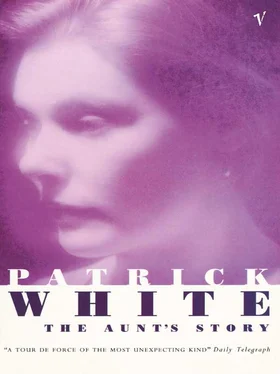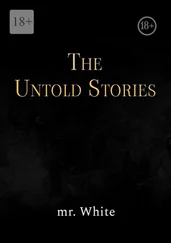In her hand she still held, she realized, the practical handbag, that last link with the external Theodora Goodman. Out of the undergrowth a small furred animal raised its head to examine her surprise. She stood, tall and black, making a shadow, at the bend in the road. She rummaged in the handbag, amongst the startling objects that people carry in such receptacles, and found aspirin and eau-de-Cologne, the snapshot of children in a row, nickels and bills and a sticky lozenge. There were also, she saw, the strips and sheaves of tickets, railroad and steamship, which Theodora Goodman had bought in New York for the purpose of prolonging herself through many fresh phases of what was accepted as Theodora Goodman. Now she took these and tore them into small pieces which fell frivolously at the side of the road. The shock of this disturbed the furred thing in the undergrowth. It ran. She heard it over sticks. Even the undergrowth, she reflected, rejects the acts of honesty. But she personally was gladder. After dawdling away quite a lot of what was now afternoon, she continued with longer strides up the rough road.
Presently this eased out. Soon we shall come to something, she knew. In a rut there was an empty can that had not yet filled with dust and stones, the wrapper still pink with an unnatural formation of Vienna sausages. Later she began to smell cool sand, soaked apparently by the trickle from a hidden spring. She noticed initials carved in the scaly bark of a tree, an uneven AJ , from which resin oozed. This last clue made her debate whether she was prepared. She touched the face which soon other faces would perhaps attempt fumblingly to read, but after hesitating a moment with her feet in the consoling sand, she went on towards the words and silences of human intercourse.
Trees thinned out in front of her, leaving an open space, a patch of ragged, ripened corn, a house that had been built purposely for living, the clutter of sheds, hutches, corral, cans, hessian tatters, and broken toys that such houses accumulate. Theodora was glad of all this. The prospect warmed many past failures. She gathered her humility and approached the wood gate, beyond which a scruffy red dog bristled and barked. At what point after she had lifted the latch the dog stopped tearing at her skirt she was not sensibly aware. Only that she looked down into his red eye, and found that he was regretting anything that might have occurred. He ran, whined, quivered, and slobbered at her hand with a large tongue.
‘Hi, Red! Down Red!’ a woman called from the house.
Although there was no need, although the dog was now abject in his puzzled friendliness, the woman called and protested until she could see her way closer to contact with the stranger.
‘You darned idiot dog!’ the woman shouted in a kind of pleasant and confused exasperation.
She was sandy as her own mountain road. Her skin was rough, freckled, unequivocal stuff.
‘It is all right,’ Theodora said. ‘We are friends.’
Children had come now. They were grouped about the mother, waiting for something to happen, to which they themselves would not immediately contribute. The children stood in the silences of expectation.
‘Come far?’ the mother asked.
‘Yes,’ said Theodora. ‘Very far.’
She hoped the woman would not make any awkwardness. She hoped this very much. The great awkwardness of questions that people ask, though they content themselves with half-answers.
‘What can we do for you?’ the woman asked.
She had screwed up her eyes in their sandy skin, but not in hostility. The children had turned to look, not at the stranger, but at their mother, as if the clue would come from her.
‘Well,’ said Theodora, ‘I don’t know that there is anything in particular.’
She could not ask to be allowed to stand, unpersecuted, there in the yard, or to sit on the edge of the porch and look at her own hands, or the children’s faces, and back to her own hands.
‘You’re miles from anywhere, you know,’ the sandy woman said. ‘Are you lost?’
‘No,’ Theodora said.
The woman quickly brushed back her sandy hair away from her eyes. She turned her face sideways and said to the corner of the porch, ‘Guess you’d better eat. Joe’ll be back soon. Then we’ll see. Eunice, quit picking your nose.’
She slapped the hand of a thin child, who put the hand behind her back and frowned.
‘Our name’s Johnson,’ the mother said.
She waited for some such contribution from Theodora, who did not make the move. So the woman immediately shifted away into deliberate activity.
‘Better come and get that dust off of you,’ she said. ‘You look a sight. It hasn’t rained here in months. We’re lucky to have our spring.’
Theodora followed Mrs Johnson into the dark confusion of the house. She avoided a celluloid doll, upturned on boards. She knocked against a sewing machine. There was a smell of boiled potatoes.
‘You must be happy to live in this house,’ Theodora said.
‘Are you crazy?’ said Mrs Johnson.
‘I mean,’ said Theodora, ‘everything is so clear. I mean …’
But she could not explain the rightness of objects to someone who already knew those objects by heart.
‘We’re well enough,’ Mrs Johnson said. ‘Though we’ll die poor. Joe ain’t got the touch.’
She pushed through into what appeared to be a wash-house, and Theodora followed behind. Then Mrs Johnson kicked some shape into chaos. The children stood around.
‘You won’t mind this,’ Mrs Johnson said, indicating with her shoulders the haphazard nature of the wash-house, its old frayed baskets, sticks, bottles, and faded cretonne.
‘You won’t mind,’ she said.
But it did not matter whether Theodora did.
While Mrs Johnson went for water, which she said was on the boil, Theodora was left to withstand the impact of the glances of children, not so much boys and girls as inquiring silences. There were four of these. Three were sandy, but one was dark. His lips were full, and red, and dark. There was a great space between the dark one and the shadowless, sandy three, the difference between depths and surface. Mrs Johnson would accept the depths, and love the depths fearfully, but she would not understand. At the moment of his birth, or moments in the arms of her husband, she had come closer to her rich dark child. But she preferred to sun her sandy self, to cover doubt with humorous exasperation. She preferred life to be unequivocal and freckled. Eunice was her mother’s child.
‘Why do you wear a hat?’ Eunice asked finally.
‘I got into the habit,’ Theodora said. ‘Like most other people, I suppose.’
‘Mother don’t wear a hat,’ Eunice said. ‘None of us don’t wear hats.’
‘Don’t you listen to her, ma’am,’ said a long boy. ‘She’s fresh.’
Theodora removed her large and shameful hat.
‘I ain’t,’ Eunice said. ‘You quit pushin’ me around, Arty. I’ll tell Mom.’
‘I like you,’ said a girl whose voice touched.
She fingered Theodora’s garnet ring.
‘What’s your name?’ the child asked.
‘Theodora.’
‘ Theerdora ? I never heard that before.’
‘What sort of name is that?’ Eunice said. ‘Hi, quit, Arty, Lily!’
Because there was a need to express shame, and they had begun to push, kick, cuff. And Eunice screamed, more out of convention than from pain.
‘Don’t you listen to her,’ they all cried.
All except the dark boy, who said nothing. He picked with a knife at the wicker of an old basket and smiled.
‘Eh, you kids, what’s all this?’ said Mrs Johnson, returning with a black kettle. ‘Kids are a pest,’ she said.
The water fell with a warm hiss into an old enamel bowl.
Читать дальше












